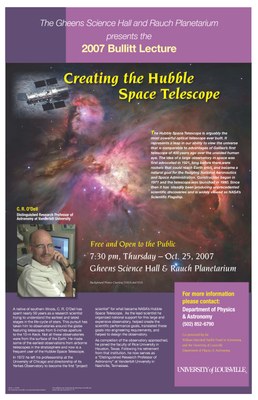Bullitt Lecture in Astronomy 2007 - Creating the Hubble Space Telescope
| When |
Oct 25, 2007
from 07:30 PM to 08:30 PM |
|---|---|
| Where | Gheens Science Hall & Rauch Planetarium |
| Contact Name | Gerard Williger, Ph.D. |
| Add event to calendar |
|
Speaker: C.R. O'Dell, Vanderbilt University in Nashville, Tennessee
Abstract: The Hubble Space Telescope is arguably the most powerfull optical telescope ever built. It represents a leap in our ability to view the universe that is comparable to advantages of Galileo's first telescope of 400 years ago over the unaided human eye. The idea of a large observatory in space was first advocated in 1921, long before there were rockets that could reach Earth orbit, and became a natural goal for the fledgling National Aeronautics and Space Administration. Construction began in 1971 and the telescope was launched in 1990. Since then it has steadily been producing unprecedented scientific discoveries and is widely viewed as NASA's Scientific Flagship.
A native of southern Illnois, C.R. O'Dell has spent nearly 50 years as a research scientist trying to understand the earliest and latest stages in the life-cycle of stars. This pursuit has taken him to observatories around the globe featuring telescopes from 5-inches aperture to the 10-m Keck. Not all these observatories were from the surface of the Earth. He made some of the earliest airborne telescopes in the stratosphere and now is frequent user of the Hubble Space Telescope. In 1972 ge left his professorship at the University of Chicago and directorship of its Yerkes Observatory to become the first "project scientist" for what became NASA's Hubble Space Telescope. As the lead scientist he organized national support for this large and expensive observatory, helped create the scientific performance goals, translated those goals into engineering requirements, and helped to design the observatory. As completion of the observatory approached, he joined the faculty of Rice University in Houston, Texas. Following his retirement from that institution, he now serves as "Distinguished Research Professor of Astronomy" at Vanderbilt University in Nashville, Tennessee.

